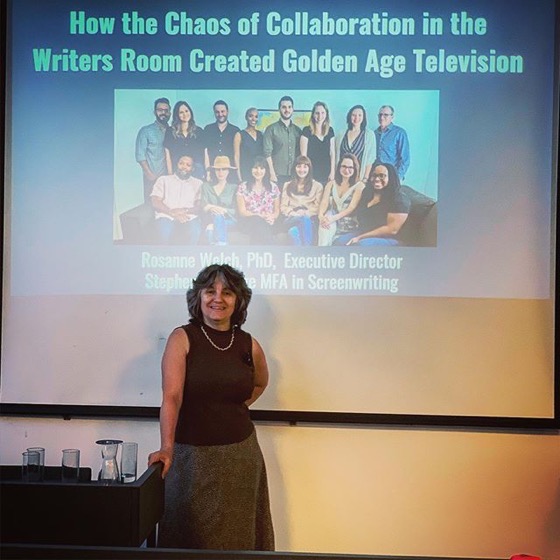Thanks to the gracious invitation from my Screenwriting Research Network colleague Paolo Russo – and a grant he was able to procure (and in the before-Covid time) I was able to spend a week at Oxford Brookes University working with the screenwriting masters students in Paolo’s course. At the culmination of the week, I gave this lecture on how writers rooms worked in the States.
Transcript:
Roberto Aguirre-Sacasa is in charge of Riverdale. Was that here yet? Based on The Archie comics which is kind of funny. First season, pretty good. Second season, getting a little sillier. Third season, getting a little sillier. Not very good but the idea that a writer’s room is like a dinner party and you’re just kibitzing with people and having a good conversation and from that people go “Oh wait. i like that and I like what you said. I’m gonna put all these things together and we’re gonna end up with a story which we all like.” Love Tina Fey. Tina Fey is a great example of going from acting because of the strength of her writing becoming the first woman to run the evening report the weekend update on SNL. Then of course she did Mean Girls. She got hired from her comic chops to write Mean Girls. May or may not know that was recently nominated for Tony because she turned it into a Broadway show. Writers own the product throughout all of its lifespans. Directors do not right? The director of the movie Mean Girls was not invited to direct the musical but she was invited to write it. So I think it’s powerful. So her and her husband. Robert Carlock is her husband so they’ve worked the last two tv shows together and that’s their opinion. Again, diversity in the room with lots of things even educational status is an important thing.
Watch this entire presentation
Subscribe to Rosanne’s Channel and receive notice of each new video!
* A portion of each sale from Amazon.com directly supports our blogs
** Many of these books may be available from your local library. Check it out!
† Available from the LA Public Library
Podcast: Play in new window | Download
Subscribe: RSS
![32 Writer’s Room As Dinner Party from There And Back Again: Writing and Developing for American TV [Video]](https://rosannewelch.com/wp-content/uploads/2021/07/rmw-oxford-brookes-32.jpg)


![05 Working The Room…from Worry and Wonder | The Courier Thirteen Podcast | Episode # 29 [Video]](https://rosannewelch.com/wp-content/uploads/2021/07/rmw-courier-13-05.jpg)
![31 Drama is about making a choice from There And Back Again: Writing and Developing for American TV [Video]](https://rosannewelch.com/wp-content/uploads/2021/06/rmw-oxford-brookes-31.jpg)

![18 Fresh Off The Boat from How The Chaos Of Collaboration in the Writers Room Created Golden Age Television [Video]](https://rosannewelch.com/wp-content/uploads/2021/06/srn-porto-18.jpg)


![04 What The Show Is from Worry and Wonder | The Courier Thirteen Podcast | Episode # 29 [Video]](https://rosannewelch.com/wp-content/uploads/2021/06/rmw-courier-13-04.jpg)
![30 Safe…But Open from There And Back Again: Writing and Developing for American TV [Video]](https://rosannewelch.com/wp-content/uploads/2021/06/rmw-oxford-brookes-30.jpg)

![17 Representation from How The Chaos Of Collaboration in the Writers Room Created Golden Age Television [Video]](https://rosannewelch.com/wp-content/uploads/2021/06/srn-porto-17.jpg)